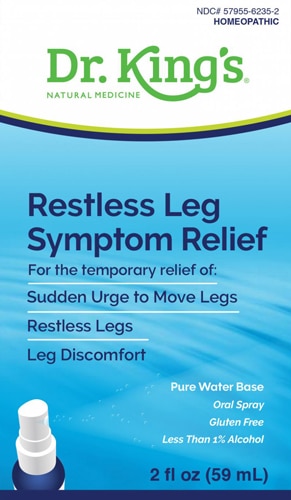[vc_row][vc_column][vc_column_text]Do you experience uncomfortable sensations in your legs such as cramping, creeping, tingling, pulling, twitching or even leg jerks, especially when lying down at night? You may have
restless legs syndrome impacts (RLS), a condition that affects 7-10% of adults in the United States.
Interested in learning more? Keep reading for more information on potential causes -- from genetic factors to underlying health conditions -- along with an exploration of how changing your diet can help you to manage symptoms and alleviate discomforts, ultimately improving your quality of life.

What is restless legs syndrome?
Restless legs syndrome is a neurological condition marked by an irresistible urge to move the legs, often accompanied by unpleasant sensations. These feelings typically arise in the evening or at night when a person is sitting or lying down, potentially disrupting sleep and daily routines.
There are two different types of RLS, early onset and late onset. Early onset is diagnosed before the age of 45 and usually runs in your family. Late onset happens after the age of 45 and progresses more rapidly.
Interesting fact: RLS is also known as
Willis-Ekbom Disease (WED). Sir Thomas Willis first documented the condition in 1685. Later, in 1945, Karl Axel Ekbom conducted a thorough clinical study and introduced the term "restless leg syndrome," which has since become its widely recognized name.
What causes restless leg syndrome?
The exact cause of this perplexing nerve condition remains unknown. Some believe it may be inherited, while others link it to nerve damage from kidney disease,
diabetes or other chronic conditions like Parkinson's disease. Iron deficiency and pregnancy, particularly in the third trimester, may also play a role.
Additionally, lifestyle factors such as alcohol and caffeine consumption, and smoking, can worsen symptoms. Certain medications, including antidepressants, anti-nausea drugs and antihistamines, have also been known to trigger or exacerbate this condition.
Nutrition and restless leg syndrome
What we eat can significantly influence symptoms of RLS, either easing or worsening discomforts. Let's take a look at the most notable nutrients.
Iron
RLS has been associated with low iron levels. Iron is an essential mineral with numerous functions, including the transportation of oxygen throughout the body, immune support and energy production. To ensure you're getting enough iron, be sure to include plenty of the following iron-rich foods in your diet:
Aim to pair iron-rich foods with
vitamin C foods for improved absorption. For example, you might enjoy the combination of orange slices with a handful of pistachios or raisins for a powerful pairing of iron and vitamin C.
Folic acid and vitamin B-12
Studies suggest
deficiencies in both folate and vitamin B-12 may contribute to RLS.
Folic acid is a water-soluble nutrient that aids in producing and maintaining cells. Folic acid is a manufactured form while folate is the naturally occurring form. Sources of folate include fruits,
beans, leafy green vegetables and fortified grains.
Vitamin B-12 plays a vital role in the metabolism of carbohydrates and overall energy production. It’s also important for the formation of red blood cells. Vitamin B-12-rich foods can be found in animal products such as meat, dairy, eggs, fish,
nutritional yeast and fortified plant-based alternatives.
Magnesium
Magnesium deficiency also is linked to RLS.
Magnesium is an essential mineral that aids in energy production, nerve function, metabolism of cells and other cellular functions. Sources of magnesium include nuts/seeds, whole grains, dark leafy greens, yogurt,
quinoa and bananas.
Caffeine
Caffeine can intensify RLS symptoms because of its stimulating effects, particularly when consumed in the evening. If you regularly drink caffeinated beverages and experience RLS, reducing your caffeine intake might help alleviate symptoms. Caffeine is present in coffee, chocolate, tea, energy drinks and some sodas. Consider swapping out caffeinated products for decaffeinated versions when possible.
Alcohol
Alcohol can interfere with your sleep and trigger symptoms of RLS. Consider reducing alcohol intake or avoiding it before bedtime. As an alternative, enjoy a delicious
mocktail. These healthful beverages are often packed with flavor and nutrition from fresh juices and other nutritious add-ins.
Hydration
Staying hydrated is crucial for managing RLS symptoms, as insufficient fluid intake can exacerbate the condition. Although individual fluid needs vary by person, general guidelines include drinking at least 2 liters of water daily, unless otherwise directed by your doctor.
Sugar and processed foods
Sugar and
processed foods can elevate blood sugar levels and promote
inflammation in the body. Heightened inflammation and unstable blood sugar levels can aggravate the discomfort and urgency associated with RLS, potentially leading to more frequent and severe episodes. Reducing your intake of
inflammatory foods as much as possible.
Other solutions for restless leg syndrome relief
While there are no cures for RLS, there are certain treatments that may help aside from following the nutrition recommendations above. It’s important to ensure you are following good sleep habits, partaking in regular to moderate exercise, managing underlying chronic conditions, and stopping or limiting activities that may aggravate RLS.
There are also some medications available that may help. These include iron therapy, anticonvulsants, opioids, benzodiazepines and dopaminergic medicines.
Other over-the-counter options may provide great relief when it comes to twitching, tingling, cramps, crawling, restlessness of legs and feet, and overall urge to move around. Consider looking into solutions such as
Dr. King’s Natural Medicine Restless Leg Symptom Relief,
Natural Care Restless Legs and
Hyland's Restful Legs.
While RLS presents a complex and often disruptive challenge, understanding its potential causes and how diet can impact symptoms offers valuable pathways to relief. By identifying and addressing underlying factors, making informed dietary choices and adopting effective strategies, individuals with RLS can better manage their condition and improve their overall well-being.
Embracing these insights and seeking personalized advice from healthcare professionals can empower you to take control of your health and find a sense of relief from the discomfort of RLS.[/vc_column_text][/vc_column][/vc_row][vc_row][vc_column][vc_text_separator title="Featured Products" border_width="2"][vc_row_inner equal_height="yes" content_placement="middle" gap="35"][vc_column_inner width="1/3"][vc_single_image image="176919" img_size="full" alignment="center" onclick="custom_link" img_link_target="_blank" css=".vc_custom_1722464220472{padding-right: 7% !important;padding-left: 7% !important;}" link="https://www.vitacost.com/nervive-nerve-relief"][/vc_column_inner][vc_column_inner width="1/3"][vc_single_image image="176918" img_size="full" alignment="center" onclick="custom_link" img_link_target="_blank" css=".vc_custom_1722464242368{padding-right: 7% !important;padding-left: 7% !important;}" link="https://www.vitacost.com/natural-care-restless-leg"][/vc_column_inner][vc_column_inner width="1/3"][vc_single_image image="176917" img_size="full" alignment="center" onclick="custom_link" img_link_target="_blank" css=".vc_custom_1722464262466{padding-right: 7% !important;padding-left: 7% !important;}" link="https://www.vitacost.com/dr-kings-natural-king-bio-restless-leg-syndrome-2-fl-oz"][/vc_column_inner][/vc_row_inner][/vc_column][/vc_row]




